 Petzlover
Petzlover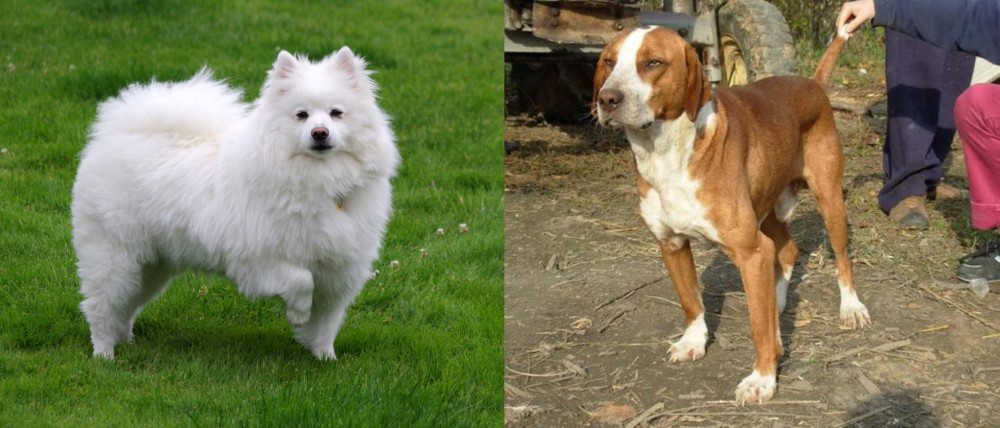 American Eskimo Dog is originated from United States but Posavac Hound is originated from Croatia. American Eskimo Dog may grow 11 cm / 4 inches shorter than Posavac Hound. Both American Eskimo Dog and Posavac Hound are having almost same weight. Both American Eskimo Dog and Posavac Hound has almost same life span. American Eskimo Dog may have less litter size than Posavac Hound. American Eskimo Dog requires High Maintenance. But Posavac Hound requires Low Maintenance
American Eskimo Dog is originated from United States but Posavac Hound is originated from Croatia. American Eskimo Dog may grow 11 cm / 4 inches shorter than Posavac Hound. Both American Eskimo Dog and Posavac Hound are having almost same weight. Both American Eskimo Dog and Posavac Hound has almost same life span. American Eskimo Dog may have less litter size than Posavac Hound. American Eskimo Dog requires High Maintenance. But Posavac Hound requires Low Maintenance
 The American Eskimo is derived from the Nordic Spitz breed and most closely related to the German Spitz in particular. There were many German Spitzes in the United States at the time of the second World War and anti-German sentiment caused its name to change to the American Eskimo Dog. However, as the breed developed over time in the States, the American Eskimo became its own separate breed. In addition to the German Spitz, the American Eskimo is also related to the white Keeshond, the Samoyed, the white Italian Spitz and the white Pomeranian.
The history is beginning to show that the Spitzes that were brought to the US in the early 1900’s was white. This color was not popular in Europe but was quickly the favorite in the United States. They were originally working dogs on farms and ranches. They have excellent herding instincts, make goo watch and guard dogs, and good law enforcement sniff dogs. However, their first introduction to the American public was through the Cooper Brothers’ Railroad Circus and Stout’s Pal Pierre at the Barnum and Baily Circus. Eskimo puppies were sold after the circus show.
The American Eskimo is derived from the Nordic Spitz breed and most closely related to the German Spitz in particular. There were many German Spitzes in the United States at the time of the second World War and anti-German sentiment caused its name to change to the American Eskimo Dog. However, as the breed developed over time in the States, the American Eskimo became its own separate breed. In addition to the German Spitz, the American Eskimo is also related to the white Keeshond, the Samoyed, the white Italian Spitz and the white Pomeranian.
The history is beginning to show that the Spitzes that were brought to the US in the early 1900’s was white. This color was not popular in Europe but was quickly the favorite in the United States. They were originally working dogs on farms and ranches. They have excellent herding instincts, make goo watch and guard dogs, and good law enforcement sniff dogs. However, their first introduction to the American public was through the Cooper Brothers’ Railroad Circus and Stout’s Pal Pierre at the Barnum and Baily Circus. Eskimo puppies were sold after the circus show.
It was then that the breed became one of America’s favorite breeds and they quickly became house pets. Following World War II, Japan exported the Japanese Spitz into America and it was crossed with the Eskimo also. The American Eskimo Dog breed was not recognized by AKC until 1985. Still in 1958 there was no official breed club in the States but there were growing numbers of the dogs. It was not until 1970 did the National American Eskimo Dog Association (NAEDA) come into being. They collected the pedigrees of the first 1750 dogs to be AKC registered.
Since the American Eskimo Dog is not recognized internationally, those wishing to participate in international competition such as England’s prestigious Cruft’s Dog Show must register their dogs a German Spitz. Despite this the American Eskimo and German Spitz remain two very different breeds.
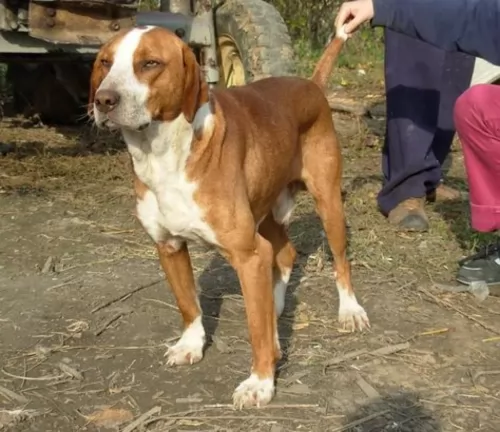 The Posavac Hound originates from Croatia and is believed to have descended from the Molossian.
The Posavac Hound originates from Croatia and is believed to have descended from the Molossian.
The name Posavac Houndare or Posavac Hound was a name bandied about and the name was officially recognized in 1969 by the Federation Cynologique Internationale.
The dog was categorized as a Scent hound. The breed is unrecognised by any of the UK or US Kennel Clubs.
 This small to medium dog is beautiful and resembles a miniature Samoyed. There are three sizes of American Eskimo – the standard, miniature, and the toy. The Eskimo’s head is wedge shaped with tall, triangular, erect ears. It has a heavily plumed tail with a sharp curl over the back. The Eskimo can burst into bold action due to their good legs and feet.
This small to medium dog is beautiful and resembles a miniature Samoyed. There are three sizes of American Eskimo – the standard, miniature, and the toy. The Eskimo’s head is wedge shaped with tall, triangular, erect ears. It has a heavily plumed tail with a sharp curl over the back. The Eskimo can burst into bold action due to their good legs and feet.
The coat is a double one with a harsh outer coat and plush inner one. The coat is always white or white with cream or biscuit markings, and visible skin in gray or pink. The American Eskimo’s ruff or mane is very heavy, and the nose, eyelids, pads and gums are black. They have dark eyes and blue are not allowed.
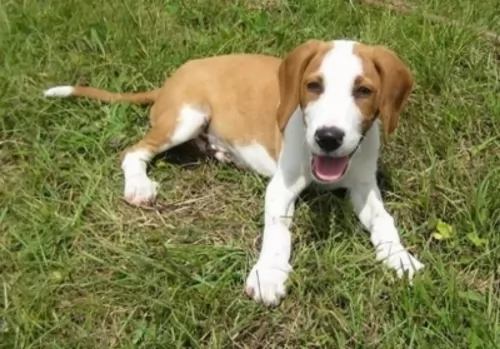 Although the Posavac Hound is a rare dog breed, people who have owned the dog say it should be far better known as it is a gem of a dog.
Although the Posavac Hound is a rare dog breed, people who have owned the dog say it should be far better known as it is a gem of a dog.
The Possie as he is fondly referred to as, is a solidly built dog resembling the Beagle. He stands at between 43 - 59 cm and weighs 16 - 20 kg.
He has long, floppy ears and a kind, gentle expression on his face. The coat is short and smooth, being slightly longer on the stomach and around the back of the legs. The coat color is a wheaten, cream shade. He has bright brown eyes and a long tail, often with a white tip.
The Posavac may look gentle, but in character he is happy and enthusiastic. He makes the most wonderfully faithful, loving dog. He likes to be busy too, game for all kinds of activities but he is intelligent as well. He responds well to training and socialization.
People who have owned this dog say he has a truly amazing temperament, being eager to please his human owner. You’ll find him getting along well with children and other pets in the home.
 The Eskimo is affectionate, playful and love children of all ages. They are intelligent and want to please you. They can be trained easily and are champions of the obedience trial. They are fun and confident. At the same time, they need a confident pack leader. He is prone to Little Dog Syndrome where the dog thinks they oversee the home and display all sorts of behaviors. Under these circumstances the American Eskimo can become obsessive, aggressive, and engaging in obsessive resource guarding and barking.
The Eskimo is affectionate, playful and love children of all ages. They are intelligent and want to please you. They can be trained easily and are champions of the obedience trial. They are fun and confident. At the same time, they need a confident pack leader. He is prone to Little Dog Syndrome where the dog thinks they oversee the home and display all sorts of behaviors. Under these circumstances the American Eskimo can become obsessive, aggressive, and engaging in obsessive resource guarding and barking.
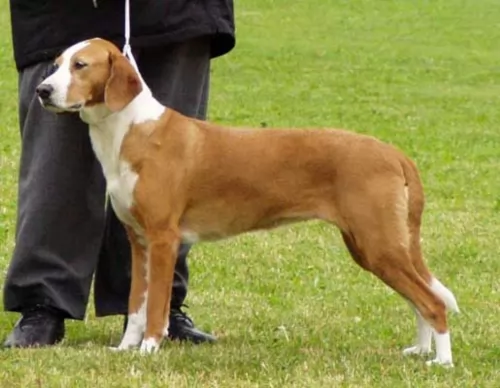 People who have kept the Posavac as a pet say he has wonderful features which make him a sought after canine friend.
People who have kept the Posavac as a pet say he has wonderful features which make him a sought after canine friend.
He has always been a working dog and he is confident and assured, independent, social and friendly. He makes a great friend of children and gets on well with other pets in the house.
He thrives on activities and doesn't want to be left to just lie around ignored. He becomes frustrated and destructive. It wont be the dogs fault but the owners. If you're looking for a lively, friendly, loving dog, you’ll find the Posavac a great addition to your home.
 The American Eskimo Dog is prone to hip dysplasia. Their eyes and tear ducts are potential issues with progressive retinal atrophy. They are allergic to fleas and have a tendency to be overweight.
The American Eskimo Dog is prone to hip dysplasia. Their eyes and tear ducts are potential issues with progressive retinal atrophy. They are allergic to fleas and have a tendency to be overweight.
We deal with PRA (Progressive Retinal Atrophy) in greater detain in a following section but it is not as destructive as it used to be. It is much more treatable now.
There are potentially some dental issues that some American Eskimo Dogs are prone to.
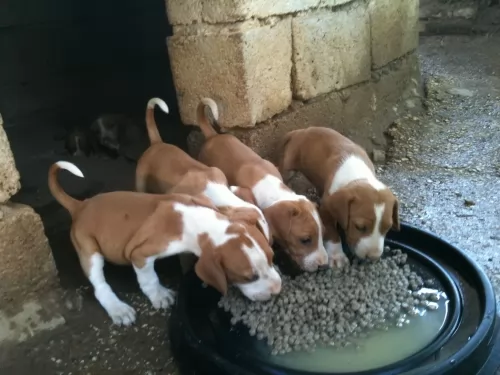 You won’t find many health disorders linked to this lovely dog. He can reach 11 – 14 years of age fairly easily if well taken care of. Of course, his floppy ears pose a bit of a problem.
You won’t find many health disorders linked to this lovely dog. He can reach 11 – 14 years of age fairly easily if well taken care of. Of course, his floppy ears pose a bit of a problem.
It is quite difficult to keep the inside of the ears dry and clean, and this means dirt, wax and moisture can cause bacteria and ear infections.
Because he is also a deep chested dog, he can be prone to bloat. Bloat is when gas collects in the stomach and it twists. You will notice your pet’s abdomen swollen and hard. He will require immediate veterinary attention.
 Your American Eskimo Dog needs a high quality food so they will not get overweight. Make sure you know how much is appropriate for your particular dog and her specific age. The puppies should be fed twice a day but adults only once.
Your American Eskimo Dog needs a high quality food so they will not get overweight. Make sure you know how much is appropriate for your particular dog and her specific age. The puppies should be fed twice a day but adults only once.
As previously mentioned the American Eskimo Dog is prone to eye issue such as Progressive Retinal Atrophy or (PRA) – this disease is inherited and used to cause blindness as the rods in the retina died. New medical discoveries mean this is no longer a hopeless disease. Their eyes are also susceptible to other issues so make sure you check them and the tear ducts regularly.
Like so many other breeds the American Eskimo is also susceptible to hip dysplasia and a moving patella in the knee. For this reason watch their weight. They can also be very allergic.
This small dog has more energy than his size can handle. He needs a lot of exercise and a place to run. If he will become hyperactive and destructive. They are prone to disturbing behaviors such as spinning (spinning in circles) when they don’t get enough exercise. The American Eskimo Dog is smart and agile, Play games like catch or agility. They are also great at herding, competitive obedience or detection.
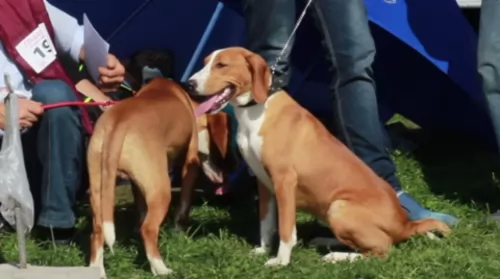 Your Posavac Hound is going to need lots of exercise. He’s used to being a working dog and being kept busy. A good walk will delight him, but it won’t be enough. If you go cycling or riding on a horse, you can count him in to run alongside you. He will also plunge into the swimming pool with you.
Your Posavac Hound is going to need lots of exercise. He’s used to being a working dog and being kept busy. A good walk will delight him, but it won’t be enough. If you go cycling or riding on a horse, you can count him in to run alongside you. He will also plunge into the swimming pool with you.
While he can adapt to life in the city, he is essentially a country living dog, loving to get outside and be active.
Because of the short, smooth coat, and being an average shedder, the Posavac will only require a brush twice a week, so he is fairly low maintenance in terms of grooming.
Check for signs of an ear infection – redness inside the ear and your pet scratching at his ear can be signs,
Trim his nails.
Check inside his mouth for teeth problems. Bad teeth can create a host of problems.
Provide your dog with an excellent diet. It needs to be nutritious food if you’re going with a commercially manufactured dog food. High quality dry kibble can be excellet for your pet, but break the monotony by mixing in some home made food occasionally. Boiled chicken, brown rice or pasta, swee pototatoes, carrots and spinach, al chopped up and mixed in twice week with the drykibble can be awaited twice a week with yur pet. Raw meat added in sometimes can also contibute to your pets health. Feeding a dog doesnt have to be complicated. Dos thrive on consistency and simplicity and this diet will have him healthy ad hapy Make sure he always has a bowl of fresh, cool water available to him.